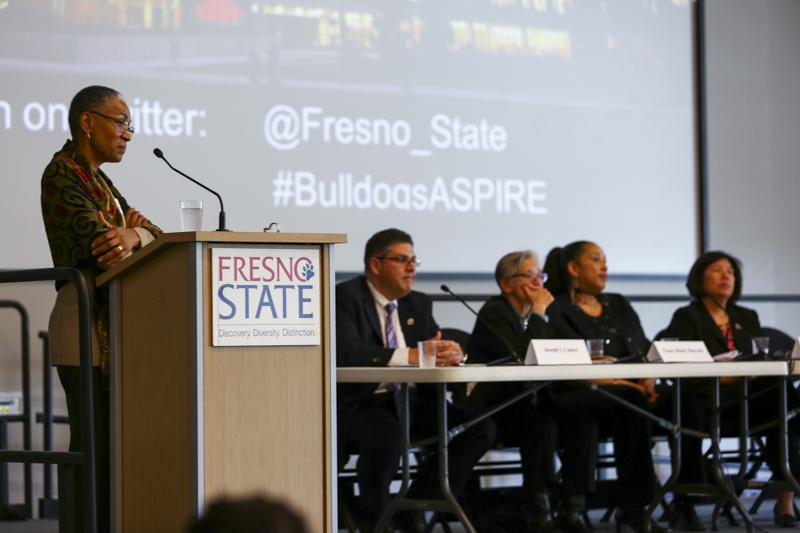
Fresno State President Joseph Castro and faculty discussed how to create an open dialogue about race on campus during Wednesday’s 2014 Diversity Forum.
The forum, a daylong event held in the Henry Madden Library, featured university administrators and experts in race relations addressing white privilege, racial tension and positive communication about race issues.
The keynote speaker, Dr. Nancy “Rusty” Barcelo, president of Northern New Mexico College, was joined by Castro; Dr. Malik Simba of Africana Studies; Dean of the College of Health and Human Services, Dr. Jody Hironaka-Juteau; and Gwen Burks, an administrative aide for the Division of University Advancement.
The panel discussed “A Strategic Plan for Inclusion, Respect and Equality (ASPIRE),” a plan that seeks to “embrace, support and promote diversity, equity, inclusion and cultural competence through all levels of the university.”
The goal of ASPIRE is to work to match Fresno State’s surrounding cultural environment, Castro said. The university can learn from other institutions that have implemented the ASPIRE model.
Barcelo said ASPIRE can bring in diversity from the boundaries and that this plan should not be another “add-on” to the institution, but rather be “woven into the fabric of Fresno State.”
Burks and Hironaka-Juteau emphasized the need for a safe place on campus where faculty members can come together and check in with one another.
“If we, as faculty, are not comfortable talking about [race], how can we be prepared to talk with our students about it?” said Dr. Alma Clayton-Pedersen, executive vice president of Emeritus Consulting Group, who served as moderator.
Hironaka-Juteau warned the audience against placing assumptions on students. Many students are still learning who they are, she said.
“When people ask, ‘What are you?’ they think, ‘Who am I?’ and much of the faculty are right there as well,” Hironaka-Juteau said.
“We don’t always agree but we have a better understanding why they think that way,” Barcelo said. “We come together to talk, not to necessarily compromise, but to gain better understanding of the other half.”




